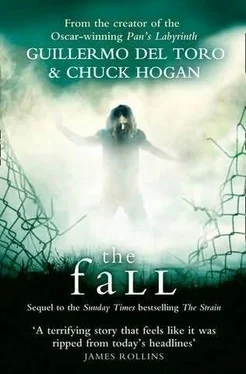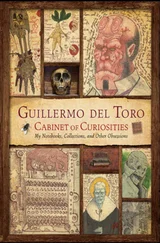Dreverhaven was a bibliophile even then, using the spoils of war and genocide-gold and diamonds stolen from the walking dead-to spend outrageous sums on rare texts from Poland, France, Great Britain, and Italy, appropriated with dubious provenance during the black market chaos of the war years. Setrakian had been ordered to do finish work on a two-room library of rich oak, complete with a rolling iron ladder and a stained-glass window portraying the rod of Asclepius. Often confused with the caduceus, the Asclepius image of a serpent or long worm coiled about a staff is the symbol for medicine and doctors. But the head of the staff on Dreverhaven’s stained-glass representation depicted a death’s head, the symbol of the Nazi SS.
Dreverhaven personally inspected Setrakian’s craftsmanship once, his blue eyes crystal-cold as his fingers traced the underside of the shelves, seeking out any rough spots. He praised the young Jew with a nod and dismissed him.
They met one more time, when Setrakian faced the “Burning Hole,” the doctor overseeing the slaughter with the same cold blue eyes. They did not recognize Setrakian then: too many faces, all indistinguishable to him. Still, the experimenter was busy, an assistant timing the interlude between the gunshot entering the back of the head and the last agonal twitching of the victim.
Setrakian’s scholarship in the folklore and the occult history of vampires dovetailed with his hunt for the camp Nazis in his search for the ancient text known as Occido Lumen.
Setrakian gave “Blaak” plenty of leeway, trailing him by three paces, just out of stinger range. Dreverhaven walked on with his cane, apparently unconcerned about the vulnerability of having a stranger at his back. Perhaps he laid his trust in the many pedestrians circling the Wallen at night, their presence discouraging any attack. Or perhaps he merely wanted to give the impression of guilelessness.
In other words, perhaps the cat was acting like a mouse.
Between two red-lit window girls, Dreverhaven turned a key in a door lock, and Setrakian followed him up a red-carpeted flight of stairs. Dreverhaven had the top two floors, handsomely decorated if not well-lived-in. The bulb wattage was kept low, downturned lamps shining dimly onto soft rugs. The front windows faced east. They lacked heavy shades. There were no back windows, and, in sizing up the room dimensions, Setrakian determined them to be too narrow. He remembered, at once, harboring this same suspicion at his house near Treblinka-a suspicion informed by camp rumors of a secret examining room at Dreverhaven’s house, a hidden surgery.
Dreverhaven moved to a lit table, upon which he rested his cane. On a porcelain tray, Setrakian recognized the paperwork he had earlier provided the broker: provenance documents establishing a plausible link to the 1911 Marseilles auction, all expensive forgeries.
Dreverhaven removed his hat and placed it on a table, yet still he did not turn around. “May I interest you in an aperitif?”
“Regrettably, no,” answered Setrakian, undoing the twin buckles on his portmanteau while leaving the top clasp closed. “Travel upsets my digestive system.”
“Ah. Mine is ironclad.”
“Please don’t deny yourself on my account.”
Dreverhaven turned around, slowly, in the gloom. “I couldn’t, Monsieur Pirk. It is my practice never to drink alone.”
Instead of the time-worn strigoi Setrakian expected, he was stunned-though he tried to hide it-to find Dreverhaven looking exactly as he had decades before. Those same crystalline eyes. Raven-black hair falling over the back of his neck. Setrakian tasted a pang of acid, but he had little reason to fear: Dreverhaven had not recognized him at the pit, and surely would not recognize him now, more than a quarter century later.
“So,” Dreverhaven said. “Let us consummate our happy transaction then.”
Setrakian’s greatest test of will involved masking his amazement at the vampire’s speech. Or, more accurately, his play at speech. The vampire communicated in the usual telepathic manner, “speaking” directly into Setrakian’s head-but it had learned to manipulate its useless lips in a pantomime of human speech. Setrakian now understood how, in this manner, “Jan-Piet Blaak” moved about nocturnal Amsterdam without fear of discovery.
Setrakian scanned the room for another way out. He needed to know the strigoi was trapped before springing on him. He had come too far to allow Dreverhaven to slip free of his grasp.
Setrakian said, “Am I to understand, then, that you have no concerns about the book, given the misfortune that seems to befall those who possess it?”
Dreverhaven stood with his hands behind his back. “I am a man who embraces the accursed, Monsieur Pirk. And besides-it seems no misfortune has befallen you yet.”
“No… not yet,” lied Setrakian. “And why this book, if I may ask?”
“A scholarly interest, if you will. You might think of me as a broker myself. In fact, I have undertaken this global search for another interested party. The book is rare indeed, not having surfaced in more than half a century. Many believe that the sole remaining edition was destroyed. But-according to your papers-perhaps it has survived. Or there is a second edition. You are prepared to produce it now?”
“I am. First, I should like to see payment.”
“Ah. Naturally. In the case on the corner chair behind you.”
Setrakian moved laterally, with a casualness he did not feel, finding the latch with his finger and opening the top. The case was filled with banded guilders.
“Very good,” said Setrakian.
“Trading paper for paper, Monsieur Pirk. Now if you will reciprocate?”
Setrakian left the case open and returned to his portmanteau. He undid the clasp, one eye on Dreverhaven the entire time. “You might know, it has a very unusual binding.”
“I am aware of that, yes.”
“Though I am assured it is only partially responsible for the book’s outrageous price.”
“May I remind you, Monsieur, that you set the price. And do not judge a book by its cover. As with most clich$eAs, that is good advice often ignored.”
Setrakian carried the portmanteau to the table containing the papers of provenance. He pulled open the top under the faint lamp light, then withdrew. “As you will, sir.”
“Please,” said the vampire. “I should like you to remove it. I insist.”
“Very well.”
Setrakian returned to the bag and reached inside with his black-gloved hands. He pulled out the book, which was bound in silver and fronted and backed with smooth silver plates.
He offered it to Dreverhaven. The vampire’s eyes narrowed, glowing.
Setrakian took a step toward him. “You would like to inspect it, of course?”
“Set it down on that table, Monsieur.”
“That table? But the light is so much more favorable over here.”
“You will please set it down on that table.”
Setrakian did not immediately comply. He remained still, the heavy silver book in his hands. “But you must want to examine it.”
Dreverhaven’s eyes rose from the silver cover of the tome to take in Setrakian’s face. “Your beard, Monsieur Pirk. It obscures your face. It gives you a Hebraic mien.”
“Is that right? I take it you don’t like Jews.”
“They don’t like me. Your scent, Pirk-it is familiar.”
“Why don’t you take a closer look at this book.”
“I do not need to. It is a fake.”
“Perhaps. Perhaps, indeed. But the silver-I can assure you that the silver is quite real.”
Setrakian advanced on Dreverhaven, the book held out in front of him. Dreverhaven backed off, then slowed. “Your hands,” he said. “You are crippled.” Dreverhaven’s eyes went back to Setrakian’s face. “The woodworker. So it is you.”
Читать дальше
Конец ознакомительного отрывка
Купить книгу












